Atlanta, Georgia, has long been recognized for its vibrant culture, robust economy, and diverse population. As of 2025, understanding the cost of living in this bustling metropolis is crucial for both current residents and those considering relocation. This article provides an in-depth analysis of various expenses associated with living in Atlanta, offering valuable insights into housing, transportation, healthcare, and more.
1. Housing Costs in Atlanta
Housing remains one of the most significant components of the cost of living. Over the years, Atlanta has experienced notable fluctuations in housing prices:
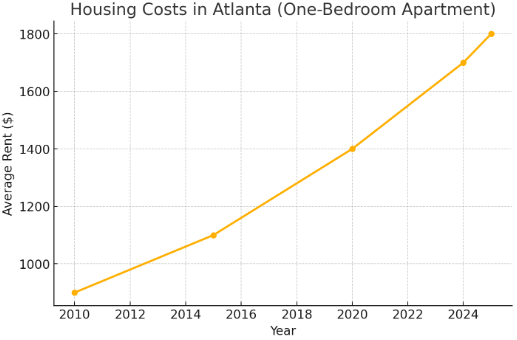
- 2010: The average rent for a one-bedroom apartment in the city center was approximately $900.
- 2015: This increased to around $1,100.
- 2020: Further rise to about $1,400.
- 2024: Reached approximately $1,700.
- 2025: The average rent for a one-bedroom apartment is $1,800. (Source)
These figures indicate a steady upward trend in rental prices, reflecting Atlanta’s growing demand for housing.
2. Homeownership and Real Estate Trends
For those considering purchasing property, the real estate market has shown significant appreciation:
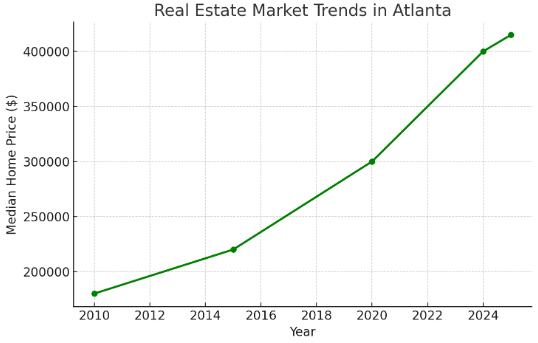
- 2010: Median home price was approximately $180,000.
- 2015: Increased to around $220,000.
- 2020: Further rise to about $300,000.
- 2024: Reached approximately $400,000.
- 2025: The median home sale price is $415,000. (Source)
This appreciation underscores Atlanta’s robust real estate market, making it both an attractive investment and a consideration for affordability.
3. Transportation Expenses
Atlanta’s transportation infrastructure offers various options, each with associated costs:
- MARTA (Metropolitan Atlanta Rapid Transit Authority): The standard one-way fare is $2.50, with various pass options available. (Source)
- Fuel Costs: As of 2025, the average price per gallon is $3.20.
- Vehicle Maintenance: Annual costs average around $1,200.
These expenses can vary based on individual commuting habits and vehicle types.
4. Utility Costs
Monthly utility expenses for a standard 915 sq ft apartment typically include:
- Electricity: $120
- Water and Sewer: $60
- Internet Services: $70
These costs are influenced by usage patterns and service providers.
5. Grocery and Food Expenses
Grocery prices in Atlanta are generally aligned with national averages. Monthly grocery expenses are estimated at $300 per person. Dining out varies widely, with meal prices ranging from $10 at casual eateries to $50 at upscale restaurants.
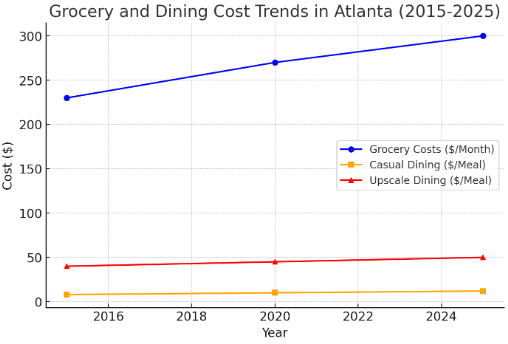
6. Healthcare Costs
Healthcare expenses encompass insurance premiums, out-of-pocket costs, and specialized services. On average, individuals spend approximately $400 monthly on healthcare, though this varies based on coverage and medical needs.
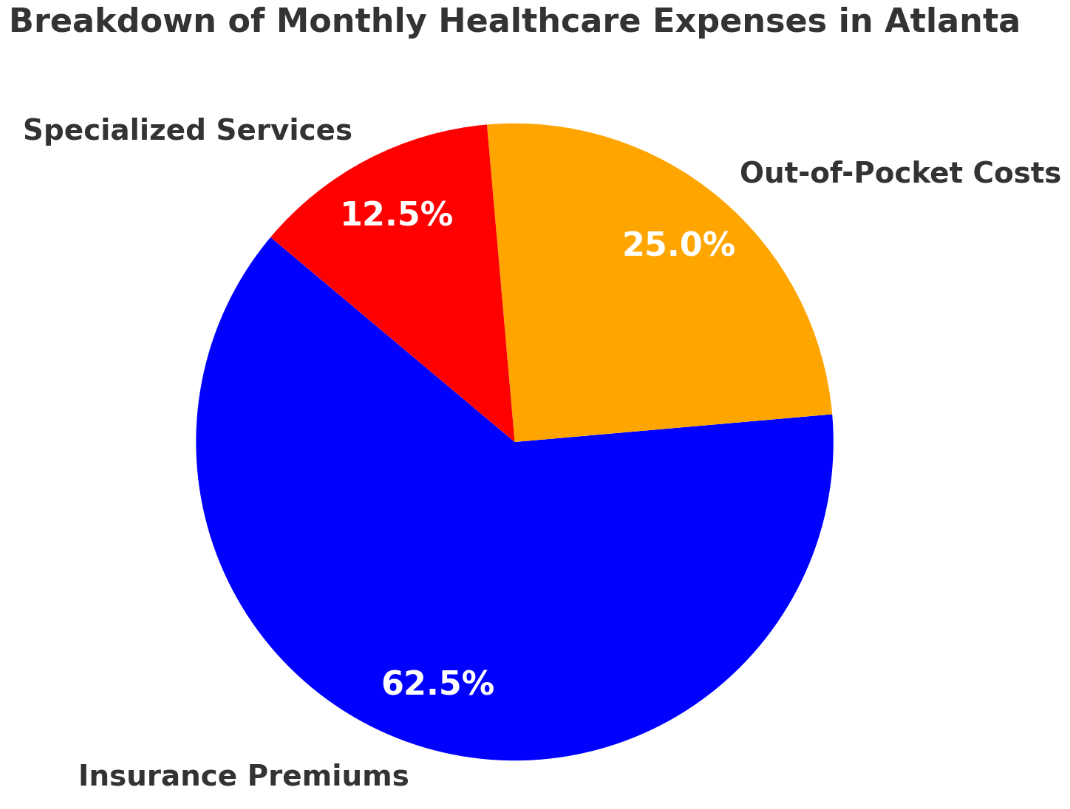
7. Educational Expenses
Atlanta offers diverse educational opportunities:
- Public Schools: Funded through taxes, with minimal direct costs.
- Private Schools: Tuition ranges from $10,000 to $25,000 annually.
- Higher Education: Institutions like Georgia State University have in-state tuition averaging $10,000 per year.
These figures can vary based on specific institutions and programs.
8. Entertainment and Leisure
Atlanta’s vibrant culture offers numerous recreational activities:
- Movie Tickets: Approximately $12 each.
- Gym Memberships: Average $40 per month.
- Sporting Events: Tickets range from $30 to $150, depending on the event.
These costs contribute to the overall quality of life in the city.
9. Taxes and Miscellaneous Fees
Understanding the tax landscape is essential:
- State Income Tax: Georgia has a progressive tax rate, with a maximum of 5.75%.
- Sales Tax: Combined state and local rates in Atlanta total 8.9%.
- Property Tax: Varies based on property value and location, averaging 1% of assessed value.
These taxes impact both residents and businesses operating within the city.
10. Childcare and Family Expenses
Families with young children should consider childcare costs:
- Daycare Services: Average $800 per month.
- After-School Programs: Approximately $200 per month.
- Extracurricular Activities: Costs vary based on activity and frequency.
Planning for these expenses is crucial for budgeting purposes.
11. Clothing and Personal Care
Annual expenditures in this category vary based on personal preferences:
- Clothing: Average $500 per person annually.
- Personal Care Items: Approximately $300 per person annually.
These costs can fluctuate based on lifestyle choices and brand preferences.
12. Insurance Costs
Insurance expenses are a significant component of the cost of living in Atlanta. Here’s an overview of the primary insurance costs:
Health Insurance
Health insurance premiums have experienced consistent increases over the past several years:
- 2010: Average monthly premium was approximately $400.
- 2015: Increased to around $450.
- 2020: Further rise to about $500.
- 2024: Reached approximately $580.
- 2025: The average monthly premium is $621. (Source)
These figures reflect a national trend of rising healthcare costs, impacting residents in Atlanta and beyond.
Auto Insurance
Auto insurance rates in Atlanta have seen notable increases, influenced by factors such as urban density and traffic patterns:
- 2010: Average annual premium was approximately $1,200.
- 2015: Increased to around $1,400.
- 2020: Further rise to about $1,800.
- 2024: Reached approximately $2,815. (Source)
- 2025: The average annual premium is projected to be $3,052. (Source)
These increases underscore the importance of shopping around for competitive rates and considering factors that influence premiums, such as driving history and vehicle type.
13. Miscellaneous Expenses
Various other expenses contribute to the overall cost of living in Atlanta:
Personal Care
- Haircuts: Average cost is $30.
- Gym Memberships: Approximately $40 per month.
Entertainment
- Movie Tickets: Around $12 each.
- Concert Tickets: Vary widely, averaging $50 to $100.
14. Income and Salaries
Understanding income levels is crucial when assessing the cost of living:
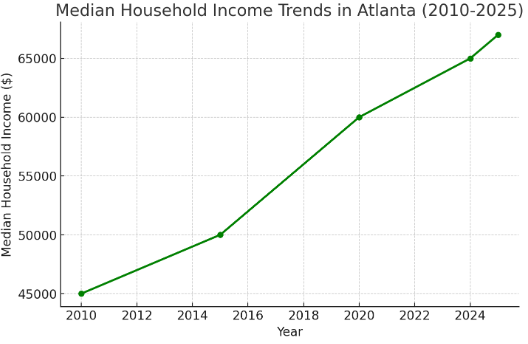
- 2010: Median household income was approximately $45,000.
- 2015: Increased to around $50,000.
- 2020: Further rise to about $60,000.
- 2024: Reached approximately $65,000.
- 2025: The median household income is projected to be $67,000.
These figures provide context for evaluating affordability and financial planning.
15. Comparison with National Averages
Comparing Atlanta’s cost of living to national averages offers perspective:
- Housing: Slightly below national average.
- Transportation: Comparable to national average.
- Healthcare: Slightly above national average.
These comparisons highlight areas where Atlanta is more affordable and areas where costs are higher.
Quick Takeaways
- Housing costs in Atlanta have steadily increased, with the average rent for a one-bedroom apartment reaching $1,800 in 2025.
- Transportation expenses, including MARTA fares and fuel costs, have risen moderately over the years.
- Healthcare premiums have seen consistent growth, with the average monthly premium at $621 in 2025.
- Auto insurance rates have experienced significant hikes, with the average annual premium projected to be $3,052 in 2025.
- Miscellaneous expenses such as personal care and entertainment contribute to the overall cost of living.
Conclusion
Atlanta’s cost of living in 2025 reflects both the city’s growth and broader economic trends. While certain expenses like housing and insurance have seen notable increases, others remain relatively stable. Prospective residents and current inhabitants should consider these factors when budgeting and making financial decisions. By staying informed and proactive, individuals can navigate the financial landscape of Atlanta effectively.
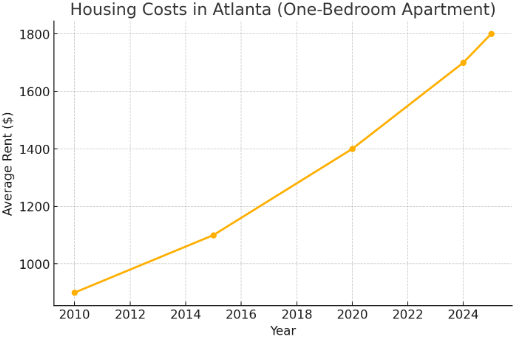
.png)

.png)
.png)